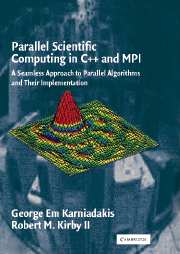 Parallel Scientific Computing in C++ and MPI
Parallel Scientific Computing in C++ and MPI Published online by Cambridge University Press: 05 October 2013
In this chapter we present discretizations for mixed initial value/boundary value problems (IVP/BVP) and for relaxation iterative solvers associated with such discretizations. The analogy between iterative procedures and equations of evolution, especially of parabolic type (diffusion), was realized about two centuries ago, but a rigorous connection was not established until the mid-1950s.
In the following, we first consider various mixed discretizations, and subsequently we derive some of the most popular iterative solvers. Our emphasis will be on parallel computing: A good algorithm is not simply the one that converges faster but also the one that is parallelizable. The Jacobi algorithm is such an example; forgotten for years in favor of the Gauss-Seidel algorithm, which converges twice as fast for about the same computational work, it was rediscovered during the past two decades as it is trivially parallelizable, and today it is used mostly as a preconditioner for multigrid methods. The Gauss-Seidel algorithm, although faster on a serial computer, is not parallelizable unless a special multicolor algorithm is employed, as we explain in Section 7.2.4. Based on these two basic algorithms, we present the multigrid method that exploits their good convergence properties but in a smart adaptive way.
On the parallel computing side, we introduce three new commands: MPI_Gather, MPI_Allgather, and MPI_Scatter. Both MPI_Gather and MPI_Allgather are used for gathering information from a collection of processes. MPI_Scatter is used to scatter data from one process to a collection of processes. In addition to providing syntax and usage information, we present the applicability of the gathering functions in the parallel implementation of the Jacobi method.
To save this book to your Kindle, first ensure no-reply@cambridge.org is added to your Approved Personal Document E-mail List under your Personal Document Settings on the Manage Your Content and Devices page of your Amazon account. Then enter the ‘name’ part of your Kindle email address below. Find out more about saving to your Kindle.
Note you can select to save to either the @free.kindle.com or @kindle.com variations. ‘@free.kindle.com’ emails are free but can only be saved to your device when it is connected to wi-fi. ‘@kindle.com’ emails can be delivered even when you are not connected to wi-fi, but note that service fees apply.
Find out more about the Kindle Personal Document Service.
To save content items to your account, please confirm that you agree to abide by our usage policies. If this is the first time you use this feature, you will be asked to authorise Cambridge Core to connect with your account. Find out more about saving content to Dropbox.
To save content items to your account, please confirm that you agree to abide by our usage policies. If this is the first time you use this feature, you will be asked to authorise Cambridge Core to connect with your account. Find out more about saving content to Google Drive.